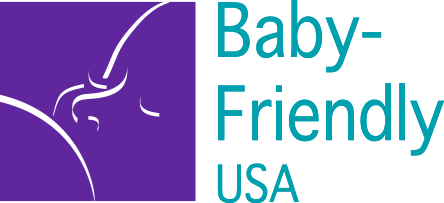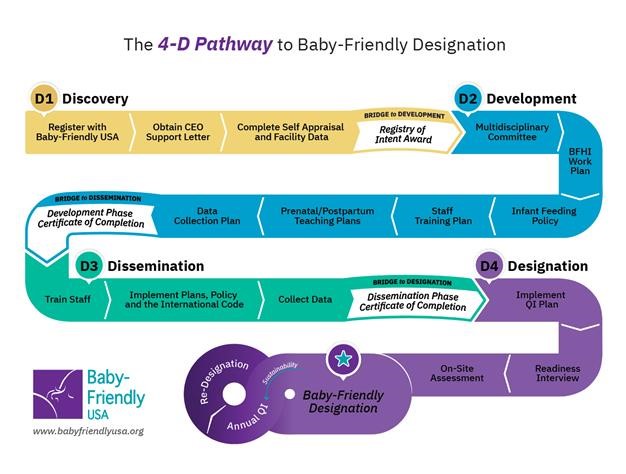The Baby-Friendly Hospital Initiative (BFHI) is a global program that recognizes hospitals and birthing centers that offer an optimal level of care for infant feeding.
Baby-Friendly, USA (BFUSA) is the recognized, national authority for the BFHI in the United States. This prestigious designation is considered the gold-standard of care for lactating women and their babies and is included as a measure on the CDC's United States Breastfeeding Report Card.

Texas Ten Step and Baby-Friendly Designation- What’s the Difference?
Designation
- TTS serves as a springboard to the BFHI program. Think of TTS as a way for your facility to get acquainted with the steps and ask questions and gain knowledge and resources on the steps, with the ultimate goal of fully implementing them (BFHI).
- Participation in the TTS program is free, and the application can be started by anyone in your facility; usually it’s a Lactation Consultant, Staff Educator or Director or Women’s Service leader. To enter the BFHI program, leadership commitment is required with a formal Letter of Intent and fees are associated with three of the phases.
- TTS review does not require site visits and all information provided on the application is voluntary and self-reported. BFHI includes onsite visits and extensive programmatic review by BFUSA staff to ensure full implementation of the Ten Steps.
Training
- The training included in the TTS application should demonstrate that 50% or greater of your staff have had the content covered on the Scorecard Evaluation Tool. Training should include both didactic content and skills-based training, but a minimum number of clock hours are not required.
- Currently BFHI training should include 20 hours of didactic and skills-based training. Designation assessments after June 2023 will require 16 specific management and support competencies. All content can be found on the BFUSA website under Guidelines and Evaluation Criteria.
Formula
- While the TTS program strongly encourages you begin to pay for formula after a fair market value assessment, it is not a requirement for designation.
- Once you enter the BFUSA pathway, your facility will begin developing a plan of action to pay fair market value for formula.
Collection of Breastfeeding Rate Data
- TTS strongly encourages your facility to collect annual breastfeeding rates but does not currently define the criteria or definition for how to do so. Many TTS facilities use the Joint Commission definition found in the current version of the specification manual. Current facilities must report their annual Initiation and Exclusive Breastfeeding at Discharge rates with each TTS re-designation application in two-year increments.
- Based on the BFUSA Guidelines and Evaluation Criteria, each facility should track its rate of formula supplementation of breastfed infants.
- The rate of supplementation for nonmedical reasons should be analyzed and compared with the annual rate of supplementation of breastfed infants reported by the Centers for Disease Control and Prevention (CDC) National Immunization Survey (NIS) data for the geographic region in which the facility is located. For Texas, that is 21% (NIS, 2016).
4-D Pathway to Baby-Friendly Designation
BFUSA created the 4-D Pathway for achieving the BFHI designation, which organizes the process into manageable and achievable tasks. There are four phases to the pathway.
- D1 Discovery- learning phase
- Register with Baby-Friendly USA
- Obtain CEO Support Letter
- Complete Self Appraisal and Facility Data
- Bridge to Development: Registry of Intent Award
- D2 Development- planning phase
- Multidisciplinary Committee
- BFHI Work Plan
- Infant Feeding Policy
- Staff Training Plan
- Prenatal/Postpartum Teaching Plans
- Data Collection Plan
- Bridge to Dissemination: Development Phase Dertifae of Completion
- D3 Dissemination- implementing phase
- Train Staff
- Implement Plans, Policy and the International Code
- Collect Data
- Bridge to Designation: Dissemination Phase Certificate of Completion
- Designation- assessing phase
- Implement QI Plan
- Readiness Interview
- On-Site Assessment
- Baby-Friendly Designation (annual QI and re-designation for sustainability)

The first three years post BFHI designation are known as the Annual Quality Improvement (AQI) Phase. During this time facilities must use audit tools provided by BFUSA to assess their implementation of the Ten Steps which helps to build in sustainability of the designation through continuous quality evaluation and improvement.
Years 4 and 5 are reserved for re-designation and the onsite assessment survey. Activities in this phase of preparation include updating and reviewing the infant feeding policy, fair market value verification form and the facility data sheet.
Designation in the Texas Ten Step (TTS) program provides an opportunity for Texas-based birthing facilities to begin adopting these breastfeeding best practices and serves as an ongoing support while facilities work through the 4D pathway. Training, patient education materials and shared-learning are just a few examples of how TTS can support your facility while you are in the pathway.
Additional information on the Baby-Friendly Hospital Initiative.
- Baby-Friendly Hospital designation has a sustained impact on continued breastfeeding. Matern Child Nutr. 2018 Jan;14(1). DOI: 10.1111/mcn.12497. Epub 2017 Aug 10
- The Impact in the United States of the Baby-Friendly Hospital Initiative on Early Infant Health and Breastfeeding Outcomes. Breastfeed Med. 2016 Jun;11:222-30. DOI: 10.1089/bfm.2015.0135. Epub 2016 Apr 15
- Impact of the Baby-friendly Hospital Initiative on breastfeeding and child health outcomes: a systematic review. Matern Child Nutr. 2016 Jul;12(3):402-17. DOI: 10.1111/mcn.12294. Epub 2016 Feb 29.
- Feltner C, Weber RP, Stuebe A, Grodensky CA, Orr C, Viswanathan M. Breastfeeding Programs and Policies, Breastfeeding Uptake, and Maternal Health Outcomes in Developed Countries. Comparative Effectiveness Review No. 210. (Prepared by the RTI International–University of North Carolina at Chapel Hill Evidence-based Practice Center under Contract No. 290-2015-00011-I.) AHRQ Publication No. 18-EHC014-EF. Rockville, MD: Agency for Healthcare Research and Quality; July 2018. Posted final reports are located on the Effective Health Care Program search page. DOI: doi.org/10.23970/AHRQEPCCER210



